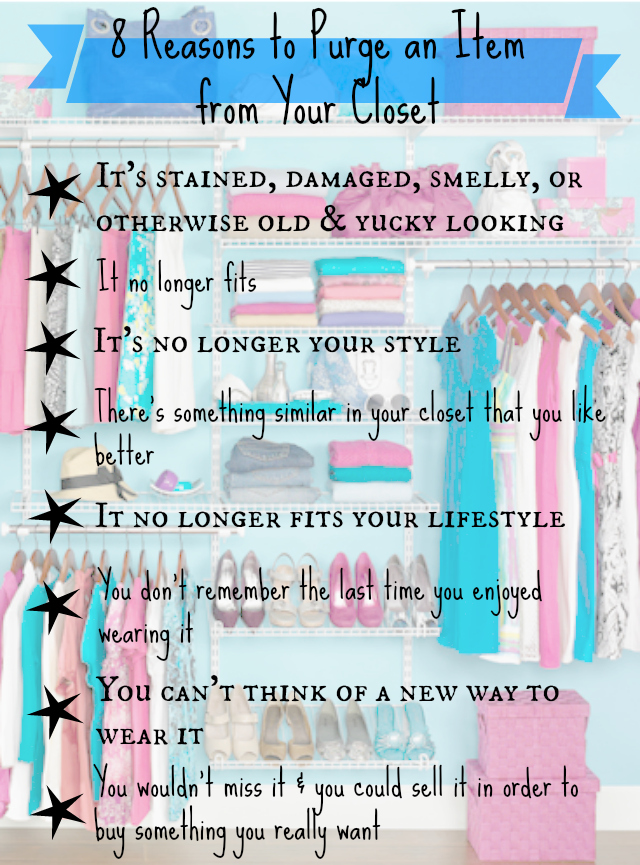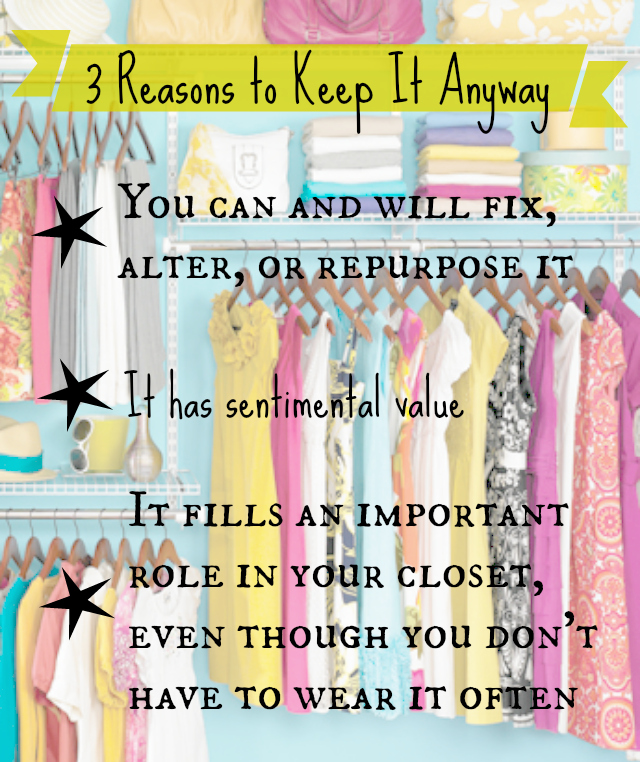Uh oh, Sarah’s about to give advice to tens of people across the Interwebs. What’s she up to this time?
Don’t worry, I’m not going to tell you to quit your job and go to law school (what kind of crazy person would do that?!). I’m going to stick to a slightly less life-altering subject: cleaning out your closet. Since I started doing my monthly budget posts and mentioned how I’ve been selling old clothes to fund new ones, I’ve had at least 3 people ask me for details on 2 different but sometimes related issues:
#1: How do you decide what to get rid of?
#2: How do you make money off your old clothes?
Now before I get into the nitty gritty, a disclaimer: This advice isn’t for everyone. Some people only go shopping a couple times a year and/or have a well-edited (read: small but functional) wardrobe. Those people don’t need help getting rid of stuff.
But for the shopaholics (like yours truly) and hoarders, you might want to take notes.
All of these tips are things I’ve learned myself over the past few years. I used to have a lot of trouble letting go of old things, but at the same time I couldn’t stop buying new things. This kind of behavior makes for an excellent best-selling book series and blockbuster movie, but in real life it leads to buyer’s remorse and a messy, overstuffed closet full of things you don’t wear.
I tried to get on board with the whole “build a wardrobe of basics” thing but then I remembered that I hate basics. For me, there is no goal of a “complete” closet. The way I see it, a complete closet is as ridiculous an idea as a complete music collection: You could get an album of every kind of music there is, but there will be times when none of those albums is what you want to listen to. There will always be new artists and new music to try. And sometimes an album you loved 5 years ago isn’t going to resonate with you anymore. See where I’m going with this?
It took an embarrassingly long time for me to figure it out, but the best option for me is to have a freely rotating closet: when new things come in, old things need to go out. As a bonus, when you learn to let go of things that are relatively new and still in great shape, you can sell those things to help pay off your new things!
Let’s get down to business with Question #1: How do you decide what to get rid of? These are the 8 reasons I generally have for pulling things off their hangers:
 Background image source (CC license)
Background image source (CC license)
Anything that falls into that first category (stained, damaged, etc.) can’t be sold, but you shouldn’t be wearing gross stuff like that anyway. Cut it up to use as rags or something.
Everything else could potentially find a new owner, whether you sell or donate. But first, here are the only 3 valid excuses I can think of to keep an otherwise purge-able item:
 Background image source (CC license)
Background image source (CC license)
I’ll clarify that last point with an example: Maybe you bought a nice suit for an interview one time, but you haven’t worn it since. One day you might need a suit again, and a nice one is expensive. If it still fits, you might want to keep it just so you don’t have to drop a couple hundred dollars again. Or maybe you have one nice cocktail dress but you’re more of a jeans girl. Same kind of deal – you might as well keep the one you have for when you need it.
Notice that “you spent a lot of money on it” is NOT one of the excuses. A too-small pair of Louboutins that you managed to find on clearance for $200 is worth $0 sitting on the floor of your closet. There’s someone in the world with smaller feet who would be happy to pay you for those so you can buy something better.
Alright. Now a little bit about Question #2: How do you make money off your old clothes? I’ve had the most luck with consignment and resale stores.
I started off at a traditional consignment boutique: You bring in your stuff, they accept what they want, and you make a percentage if it sells within a certain amount of time. If not, you can get your stuff back. I had more luck with bags, shoes, and accessories at a traditional consignment store. I think my clothes didn’t sell that well because I’m much smaller than average size.
A few months ago, I switched to a resale boutique that pays cash on the spot. Most people have heard of Plato’s Closet, but they only buy “teen” clothing so they’re not interested in your fabulous Ann Taylor dress. But with a little internet research, I found several resale options for actual adults near me. (To find these places in your area, Google something like “women’s resale fashion [your city].”) I’ve had better luck with these places because I can actually make money off my clothes, not just accessories.
A lot of consignment and resale shops will say they only sell “designer” goods, but don’t let that discourage you. I’ve taken A LOT of clothes to these places – sometimes I’m surprised at what they want, and sometimes I’m surprised at what they don’t want. If one place turns you down, try another one (or even try the same one a month later…seriously). It might just be a matter of what they already have too much of in stock.
The latest trend in resale is the Poshmark app. I won’t try to give a ton of advice about this one because I’ve only used it once, but I was successful! I think Poshmark is a good way to go if you have a designer item that people would actually seek out and pay big bucks for. I sold a used marc by Marc Jacobs bag on Poshmark for $120. Poshmark takes a 20% commission, but $96 is a lot more than I could have gotten if I had sold it to my usual resale place. My advice is to start your price pretty high, then gradually lower it until someone bites – it worked for me! Just Google “Poshmark” if you want more info about it; there are tons of reviews out there.
OK, guys. That’s it. I hope those 3 people who asked me these questions feel fully informed now. More questions? Your own advice? Leave them in the comments! Maybe you’ll inspire a future post. And pretty please: If there are any shopaholics and hoarders in your life, share this with them on Facebook. Or if you want to be passive aggressive about it, just pin it on Pinterest and hope they see it.


